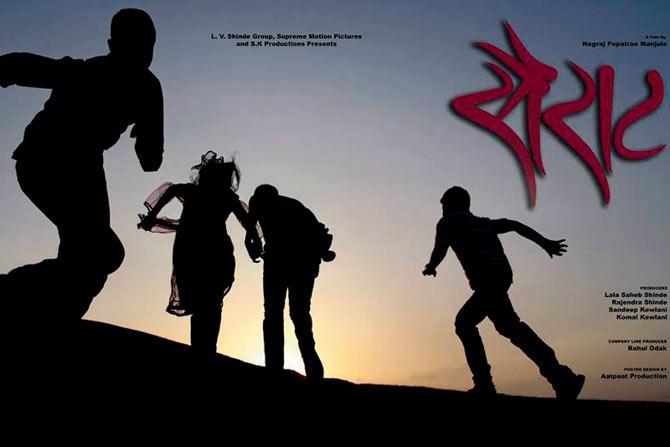In this age of globalisation, it is worth noting that both the Indian films selected at the 66th Berlin Film Festival this year — Nagraj Manjule’s Sairat (Wild, Marathi) and Jayaraj Nair’s Ottaal (The Trap, Malayalam) — are very local films.

A film poster of Sairat
 In this age of globalisation, it is worth noting that both the Indian films selected at the 66th Berlin Film Festival this year — Nagraj Manjule’s Sairat (Wild, Marathi) and Jayaraj Nair’s Ottaal (The Trap, Malayalam) — are very local films. They have not been anywhere near a script or co-production lab, nor have any foreign funding. Both films got rousing ovations and full houses at their screenings here in Berlin, so local can be very global. It is important that all the cinemas — Bollywood, international co-productions, and independent, regional films — be offered to audiences at festivals and at home. Good regional films can have locally rooted stories, original voices and rough textures, which may be smoothed out at labs, with foreign funders influencing the narrative. In fact, I raised this issue at ‘India’s Big Chance’, the European Film Market Industry Debate at the Berlin Film Festival last week.
In this age of globalisation, it is worth noting that both the Indian films selected at the 66th Berlin Film Festival this year — Nagraj Manjule’s Sairat (Wild, Marathi) and Jayaraj Nair’s Ottaal (The Trap, Malayalam) — are very local films. They have not been anywhere near a script or co-production lab, nor have any foreign funding. Both films got rousing ovations and full houses at their screenings here in Berlin, so local can be very global. It is important that all the cinemas — Bollywood, international co-productions, and independent, regional films — be offered to audiences at festivals and at home. Good regional films can have locally rooted stories, original voices and rough textures, which may be smoothed out at labs, with foreign funders influencing the narrative. In fact, I raised this issue at ‘India’s Big Chance’, the European Film Market Industry Debate at the Berlin Film Festival last week.

A film poster of Sairat
Ottaal comes here loaded with National, Kerala State, Mumbai Film Festival and International Film Festival of Kerala awards. It is a lyrical film about a little boy and his grandfather in Kerala, that addresses child labour, about which I have written before. But Nagraj Manjule’s Sairat just had its world premiere at the Berlin Film Festival.
Sairat is a powerful film about how a young couple in love in rural Maharashtra, feels the full force of the caste system. It is a worthy successor to Manjule’s National Award-winning short Pistulya, and impressive debut feature Fandry (Pig), which has been feted worldwide. Parshya (Prashant Kale), a charming, low caste boy in Bitargaon village, is madly in love with Archie (Archana Patil), the upper caste Patil’s feisty daughter. The venal Patil owns much of the village, and treats the lower castes with scorn. When Archie and Parshya are caught kissing, all hell breaks loose, and the couple elopes. In the anonymous freedom of a big city, they get a life — jobs, a baby, even a new flat. They are a loving, decent, hardworking couple, who want nothing more than to be left alone to pursue domestic happiness. But caste has deep roots in India, and the stunning climax is so unexpected — though it should hardly surprise — it makes you gasp.
For all the apparent modernity of Indian cities, feudal, rural traditions still rule. Love is still a punishable crime. When Archie and Parshya’s affair is ‘exposed’, the Patils’ goons brutalise the couple; Patil orders Parshya to move to another town; and Dalit houses are burnt. When they elope, the police follow Patil’s orders, slapping false kidnap and rape cases, and arresting Parshya and his friends.
Sairat’s theme is similar to Fandry — about an impossible romance across the caste divide. But, Manjule takes his craft a step forward with mainstream elements — four songs and dances, and a dream sequence - and pulls it off with panache.
Sairat is a strongly feminist film — and its rural heroine does things few Bollywood urban heroines would dare to do today — other than Anushka Sharma in NH10. She drives the romance. She rides an Enfield Bullet to college, and a tractor to her boyfriend’s house. She shoots her dad’s goons with a gun, and even rescues the hero from police detention. How many Bollywood films would have the heroine saving the hero from a gang of goons? Would macho Salman Khan or Akshay Kumar agree?
The film is a searing socio-political comment on India’s deeply regressive sexism and patriarchy. The eloping lovers also pass right wing goons with saffron flags, thrashing couples on the road. Manjule has a marvelous gift for developing credible characters we care about, for telling scenes, a sharp ear for dialogue and wicked humour. He is finely tuned to the shifting feelings of the couple who finally have each other — self-doubt, loneliness, jealousy and missing home.
The ensemble cast is marvelous - Rinku Rajguru as Archie, Aakash Thosar as Parshya, his lovable buddies, and all the minor characters. Sudhakar Reddy’s cinematography is superb. Ajay-Atul’s music is catchy ‘Yad lagla’), but four songs and the waltzy Western music are too much. The film is both cynical and hopeful, but it is rather long at 170 mins. Manjule, who has experienced first-hand the struggle for education, is today an acclaimed poet and filmmaker. Yet, love remains a crime. The film, co-produced by Zee Studios and Aatpat Productions, is scheduled for release in April. Don’t miss it.
Meenakshi Shedde is South Asia Consultant to the Berlin Film Festival, award-winning critic, curator to festivals worldwide and journalist. Reach her at meenakshishedde@gmail.com.
 Subscribe today by clicking the link and stay updated with the latest news!" Click here!
Subscribe today by clicking the link and stay updated with the latest news!" Click here!







